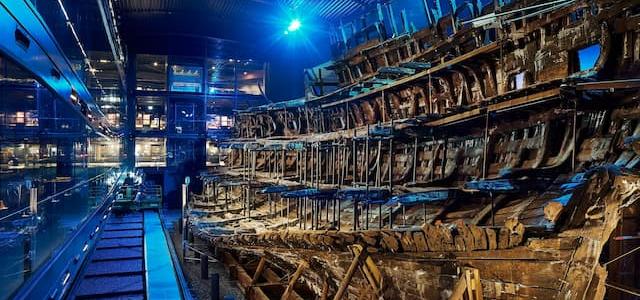
“Never was better stuff penned”: Brontë manuscripts amongst outstanding literary collection saved for the nation
A £4million NHMF grant – the largest ever given towards the acquisition of literary manuscripts – has helped secure The Honresfield Library and make it publicly available for the first time.
The Honresfield Library was formed towards the end of the 19th century by William Law (1836-1901), a self-made Rochdale mill owner living at Honresfield house, near Haworth. He brought together an exceptional collection of manuscripts in the hands of the Brontë sisters, Jane Austen, Robert Burns and Sir Walter Scott, alongside c.1,400 printed books.
The bulk of the library has remained in private ownership since, inaccessible and rarely examined.
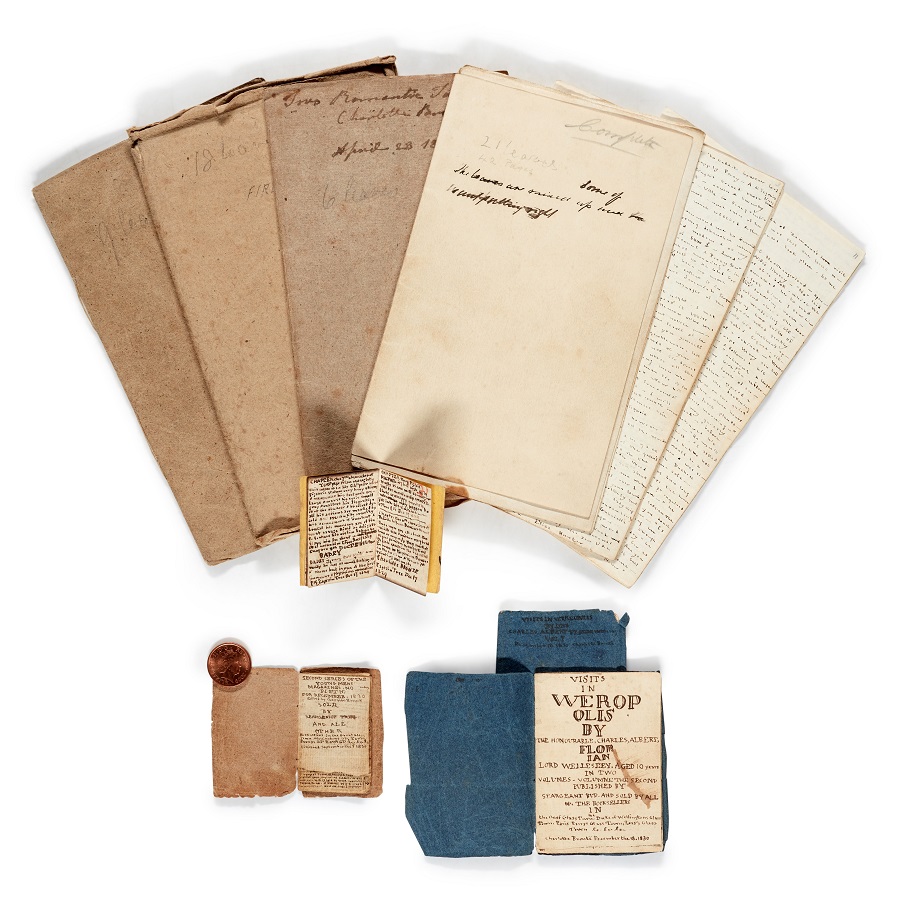
A chance for public ownership
After being hidden away for 80 years, the sale of the library was announced by auction house Sotheby’s in May 2021. It would take place in three lots.
Fearing it could be bought by private owners – its contents dispersed outside the UK and remain out of public view – Friends of the National Libraries (FNL) stepped in. The charity – devoted to saving the nation’s written and printed heritage – encouraged Sotheby’s to postpone the sale, giving FNL the chance to raise the substantial sum of £15.3m to purchase the library outright.
Taking a novel approach
FNL convened and led a consortium of eight institutions in England and Scotland (see below) that would receive significant works from the library if their bid was successful. Taking this novel approach meant the entire library would be preserved as a single entity, but its literary treasures would be distributed to appropriate museums, historic houses and libraries across the UK so that as many people as possible could benefit.
They collaborated on an extensive fundraising campaign, widely supported in the UK and overseas.
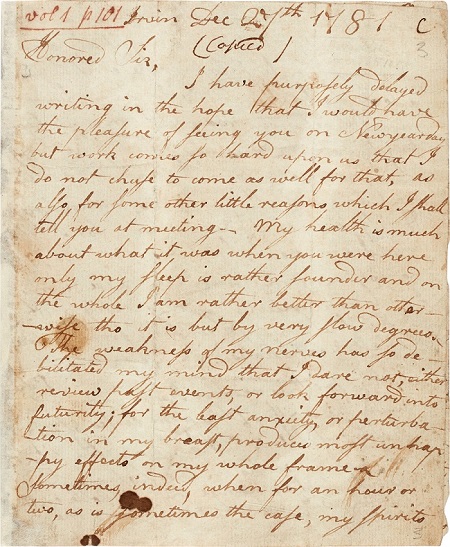
More treasures saved thanks to NHMF funding
FNL and the consortium members are delighted to announce today that, thanks to the generosity of many funding bodies and individuals, the fundraising target has been met.
The total includes a £4m NHMF grant. Ros Kerslake CBE, NHMF’s Chief Executive, said: “We at the National Heritage Memorial Fund are delighted to have supported the campaign to save Honresfield Library with £4million, the largest amount we have ever granted towards an acquisition of literary manuscripts since our formation in 1980.
“This is truly a once-in-a-lifetime opportunity to acquire such an outstanding and nationally significant collection. The NHMF is a fund of last resort, and the astonishing array of manuscripts will join over 1,000 heritage treasures saved for the nation.
The NHMF is a fund of last resort, and the astonishing array of manuscripts will join over 1,000 heritage treasures saved for the nation.
Ros Kerslake CBE, NHMF Chief Executive
"With the Honresfield Library now secured for public ownership, organisations across the UK will benefit from these literary gems joining their collections.
“I am proud that this incredible archive will be the last major acquisition we will support under my leadership, before I step down at the end of the year.”
Footage courtesy of DCMS.
The largest contribution comes from Sir Leonard Blavatnik, who has match funded the rest of the donations and provided half the asking purchase price. The library will now be known as the Blavatnik Honresfield Library in recognition of his generosity.
Funding was also received from the eight consortium members (see below), The Prince of Wales Charitable Foundation, The Murray Family, Camelot Group, The David Cocke Foundation, The T S Eliot Foundation, Hugh and Catherine Stevenson, The Berkeley Foundation, The Ardeola Trust and the Penchant Foundation.
Many others trusts and foundations contributed anonymously, and personal donations were received from over 1,500 individuals through an online appeal.
A stunning collection
The Brontës
At the heart of the Blavatnik Honresfield Library lies a stunning set of manuscripts in the hands of Charlotte, Emily and Anne Brontë.
The jewel of the Brontë collection is Emily Brontë’s notebook of 31 poems, believed by many scholars to have been lost. This poetry notebook carries annotations in Charlotte’s hand.
Never was better stuff penned
Emily Brontë, last page of her notebook of 31 poems (1844) (see bottom of left page in image below)
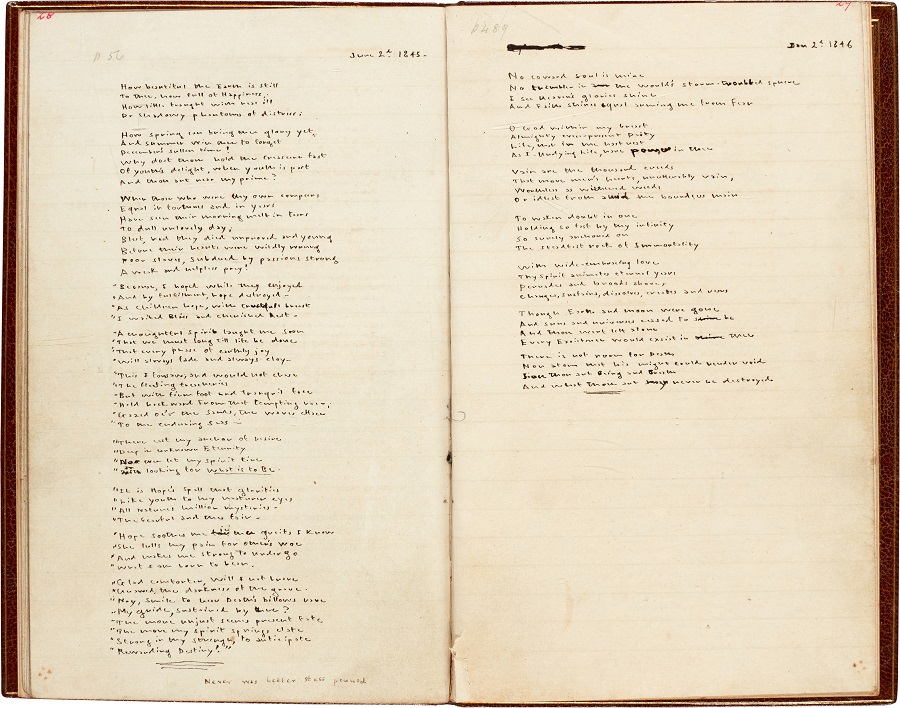
The Brontë collection also includes:
- seven of Charlotte Brontë’s famous ‘little books’, each of which is a work of art
- a manuscript collection of poems by Anne Brontë
- 25 letters by Charlotte Brontë
- a small but exquisite autograph manuscript diary note shared by Emily and Anne Brontë
- Emily Brontë’s own annotated copy of a first publication of the exceptionally rare Poems of 1846
- fine presentation copies of first editions of their novels in their original cloth bindings
Sir Walter Scott
The collection contains the complete working manuscript of Sir Walter Scott’s iconic novel Rob Roy.
Honour is a homicide and a bloodspiller, that gangs about making frays in the street; but Credit is a decent honest man, that sits at hame and makes the pat play.
From Sir Walter Scott’s Rob Roy, 1817
The other Walter Scott gems are:
- part of the autograph manuscript of Scott’s verse romance, The Lay of the Last Minstrel
- his light-hearted travel journal of a voyage off the Scottish coast in 1814
- a copy of Border Antiquities with extensive manuscript revisions
- an exceptional group of Scott first editions in their original condition
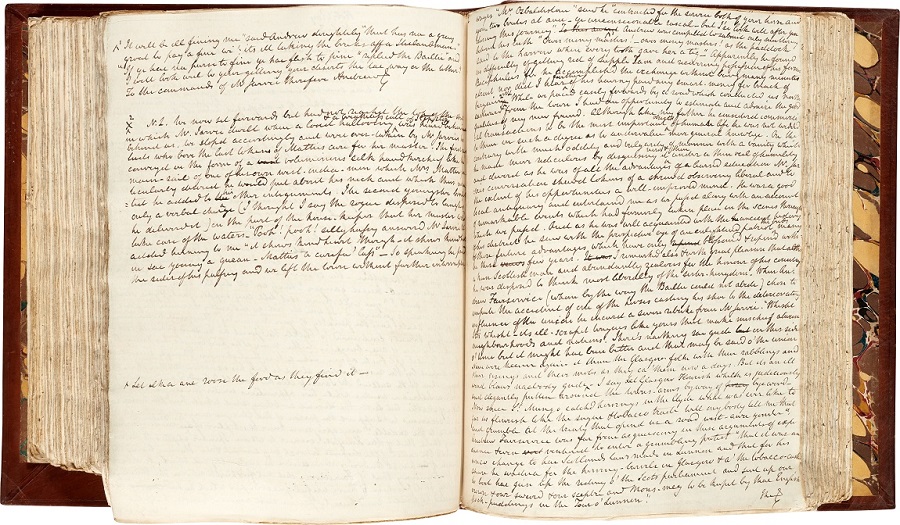
Robert Burns
Of huge importance is a volume of poems by Robert Burns in his own hand. Known as the First Commonplace Book, it contains some of his earliest recorded literary works.
Other Burns items include:
- individual autograph poems Lass of Cessnock Banks and The Brigs of Ayr
- a group of the poet’s earliest correspondence, including the only letter to his beloved father still in existence
I foresee that very probably Poverty & Obscurity await me.
Robert Burns, in the only letter written to his father (27 December 1781)
Jane Austen
Jane Austen is represented by two hugely significant letters to her sister Cassandra. Only three early such autograph letters are held in any UK national collection, the bulk being in the Morgan Library, New York.
At length the day is come on which I am to flirt my last with Tom Lefroy, and when you receive this it will be over. My tears flow at the melancholy idea.
Jane Austen, in her letter to her sister Cassandra (14 January 1796)
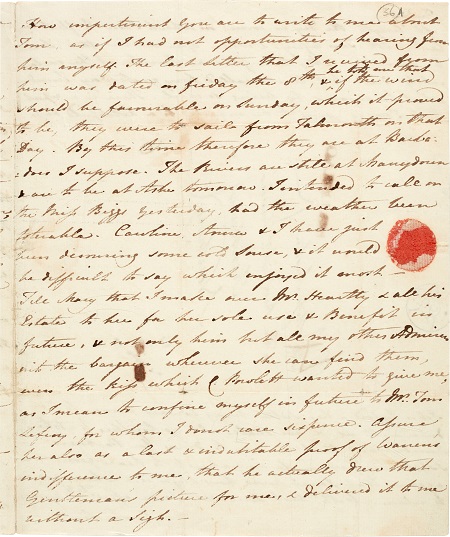
One is a very early letter, written on the eve of a ball where she anticipated the end of a love affair. The second dates from 1813 and discusses the reception of both Pride and Prejudice and Sense and Sensibility.
The collection also includes first editions of Pride and Prejudice, Emma, and Northanger Abbey and Persuasion in their original condition.
Spread across the UK
The eight consortium members will receive works by the Brontë sisters, Burns, Austen and Scott. The works will be distributed as follows:
Charlotte, Emily and Anne Brontë
- The British Library, London and York
- The Brontë Parsonage Museum, Haworth
- The Brotherton Collection, University of Leeds
Jane Austen manuscripts
- The Bodleian Library, Oxford
- Jane Austen’s House Museum, Chawton
Sir Walter Scott
- The National Library of Scotland, Edinburgh and Glasgow (also receives Robert Burns items)
- Abbotsford: The Home of Walter Scott, Melrose, Scotland
Robert Burns
- The National Library of Scotland, Edinburgh and Glasgow (also receives Sir Walter Scott items)
- The Robert Burns Birthplace Museum, Alloway – National Trust for Scotland
1,400 printed books
The Blavatnik Honresfield Library's c.1,400 printed books will be donated not only to the consortium members but also to a large number of institutions across the UK, ensuring that as many people as possible can enjoy this treasure trove of literature. FNL will not retain any of the collection.
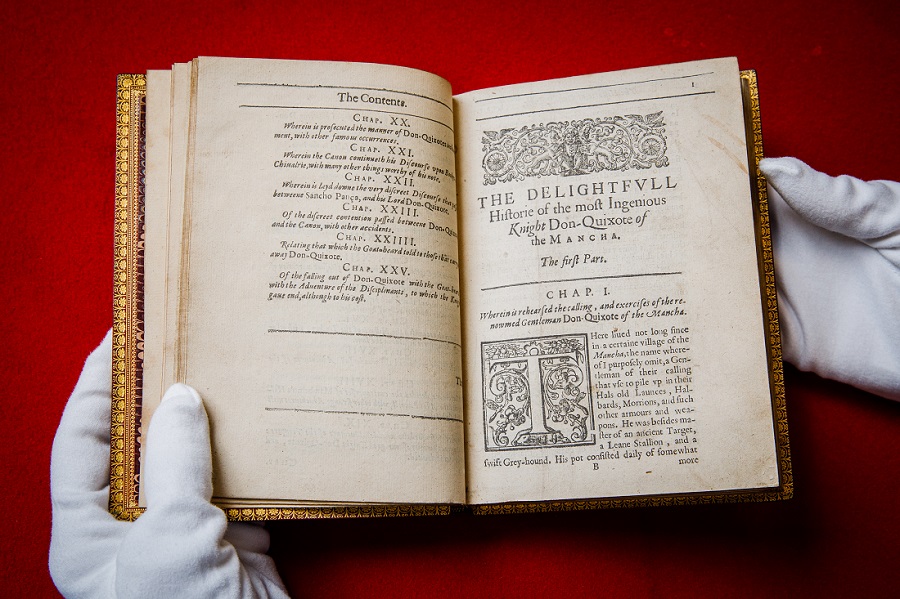
Further details will be announced soon, alongside plans for digitisation, exhibitions, education, community activities and research projects.
With thanks to Professor Kathryn Sutherland, St Anne’s College, Oxford, for her support in identifying citations from the literature.
NHMF funding available
For over 40 years, NHMF has provided financial assistance towards the acquisition, preservation and maintenance of some of the UK’s finest heritage at risk of loss.
Alongside our standard funding stream, our £40m COVID-19 Response Fund is currently available and providing a lifeline for nationally important heritage assets affected by the pandemic.
Stay updated about the NHMF
To hear the latest news about NHMF funding:
- Follow us on LinkedIn and Instagram
- Sign up to our mailing list

